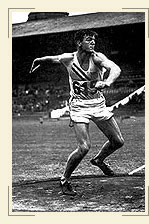|
 Bob
Mathias
Bob
Mathias
When Bob Mathias, one of the greatest decathletes of all times, decided to give up sport, he was just 21years old. Until then he had taken part in  only twelve decathlon games and won them all. Two of those games were the 1948 London Olympics and the 1952 Helsinki Olympics, where he had won two gold Olympic medals in a row. only twelve decathlon games and won them all. Two of those games were the 1948 London Olympics and the 1952 Helsinki Olympics, where he had won two gold Olympic medals in a row.
Robert Bruce Mathias, as was his full name, was born on 17 November 1930 in a small town of California, Tourale. His father, who was a doctor and a former football player, had his three sons taking up sport from their childhood. Their house's backyard had been converted into a training field for athletics. In his adolescence Mathias excelled in many track and field events in school games, as well as in basketball and football. The first time he took part in decathlon games was a few months before the Olympic Games of 1948 at regional games of the United States, without having been specially prepared for all decathlon events. Then he participated in the preliminary games for the Olympics, where he won comfortably. His third participation in a decathlon game was in London. He won again and became the youngest winner in athletics in the history of the Olympic Games. After his return from the Games, Mathias, who was unknown a few months earlier, was declared top US athlete for that year.
The next year he finished high school and continued his studies at Stanford. He pursued sport, both the decathlon and football. In 1950 he set a world record in the decathlon and won for the third time in a row the national US championship. In 1952 he repeated his victory in the national championship, which coincided that year with the preliminaries for the fifteenth Helsinki Olympics. There, he won for the second time a gold Olympic medal (setting a new world record), an accomplishment that only the British Thompson was able to repeat almost thirty years later (1980, 1984).
After the Olympic Games of 1952, when he was only 21 years old, he gave up sport. Two years later a film was made of his life, starring himself. He played in a few more films, making appearances in television as well, and in 1966 he was elected member of the US Congress, maintaining that position until the mid-1970s. Then he held several administrative posts in the field of sport. He is considered until today one of the most popular Olympic winners in the USA.
|